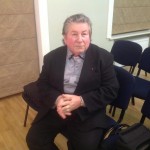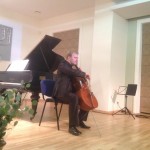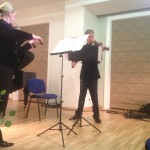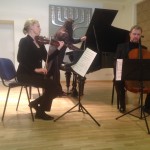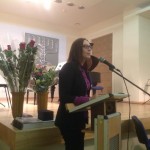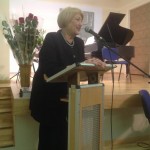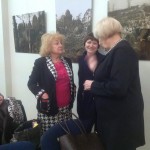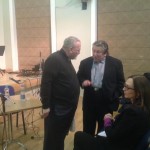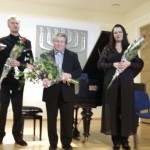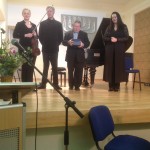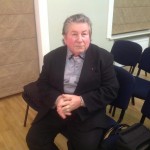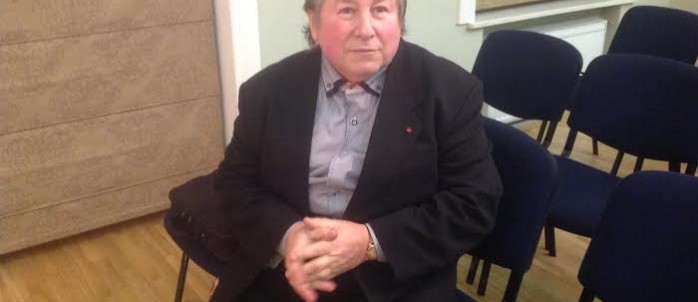
The twenty-second installment of the “Destinies” series regularly organized by Lithuanian Jewish Community deputy chairwoman Maša Grodnikienė featured one of the most famous of contemporary Lithuanian composers, National Prize recipient Anatolijus Šenderovas. Kamilė Rupeikaitė-Mariniuk, PhD, deputy director of the Vilna Gaon Jewish State Museum and an expert in cantillation and music, led the conversation with the composer.
Šenderovas, considered modern composer of unique talent, spoke cheerfully of his life and his musical career. Lithuanians seem quite proud of their composer. His works are performed by many musicians and orchestras, and new variations upon them constantly appear. Many people turned out for the “Destinies” event and left the auditorium inspired by his amazing energy.
Šenderovas said it’s important to him that his music reach the audience, and reach into their thoughts and feelings. “As with art, music is the universal language of emotions, intellect and consciousness. I always try to speak positively and to appeal to the highest feelings and emotions of the listener. Culture is the only thing we can use to oppose aggression and hate. Through culture we can communicate with the entire world, be noticed and become more understood. The theme of our nation occupies an important place in my work. I see the world through it, and it is nice that this only heightens audience interest. Even if the audience doesn’t always understand everything, they always feel something.” Along with the discussion with Šenderovas, musicians performed at the “Destinies” event, including Tomas Petrikis (alto) and the trio FortVio consisting of Indrė Baikštytė (piano), Ingrida Rupaitė-Petrikienė (violin) and Povilas Jacunskas (cello).
Šenderovas is the only Jewish composer currently producing work in Lithuania, and is one of the most popular composers in the country. His music is also played abroad. This year on the occasion of his 70th birthday the composer was awarded the highest honor of the Lithuanian Ministry of Culture, the honorary medal “Carry Your Light and Believe.” It almost seemed as if the name of the word had been formulated especially for Šenderovas. The composer said he didn’t believe music could change an increasingly aggressive world, but it could encourage the individual to positive action. His “Dialogue for Violin and Alto” performed at the “Destinies” event is a clashing dialogue which ends in reconciliation. The listener is overcome with warm feelings hearing the Jewish melodies interwoven into his works. Both the parents of the composer, who has perfect-pitch hearing, were professional musicians: his father played cello, his mother piano, and his grandfather played klezmer music with an extraordinarily acute ear.
Rare Telefilm footage was screened at the event showing Šenderovas playing music with his father, and a concert by his mother and father. Footage was also shown of the premiere of Šenderovas’s cycle “From the Forgotten Book” at the World Litvak Congress. In addition, Liora Grodnikaitė performed seven Jewish songs at the event.
Famous Jewish liturgical music performer and cantor-tenor Joseph Malovany, who has performed many works by contemporary composers dealing with Jewish themes, said quite succinctly about Šenderovas: “Šenderovas’s music is unique in that he, who hasn’t lived in Israel and did not have an opportunity to find his roots after the war, has managed very well to absorb, express and transmit the essence of Jewish music and traditional motifs both liturgical and secular, and to turn them into art. Šenderovas is a wonderful symphonist, not just understanding each individual instrument in the orchestra, but their combinations, and what effects those combinations create. Šenderovas makes very effective use of Jewish motifs. Writing for the cantor, whose part is more recital than melody, he writes so perfectly it’s as if he had grown up with it. … Šenderovas uniquely combines traditional synagogue musical motifs which we cantors originate at Sinai, from the time when God gave the Torah to the Jewish people on Mount Sinai, with modern orchestra techniques, creating effects which testify to his talent and mastery.” (from Dr. Kamilė Rupeikaitė-Mariniuk’s conversation with cantor Joseph Malovany).
Biographical facts:
Šenderovas was born in Vilnius. In 1967 he was graduated from the Lithuanian State Conservatory in the composition class of professor E. Balsys. In 1990 he did work abroad at the S. Rubin Music Academy in Tel Aviv. From 1995 to 1997 he studied composition at the N. A. Rimsky-Korsakov Saint Petersburg State Conservatory. He has participated at over 30 international music festivals, including ballet presentations.
Snapshots from the “Destinies” event:


